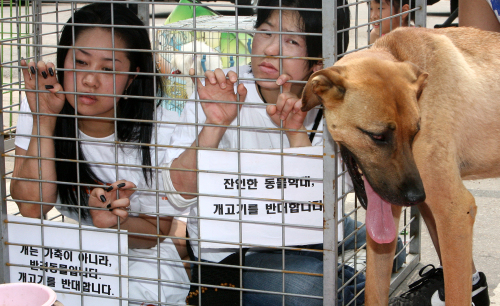
Eating man’s best friend
The production and consumption of dog meat is somewhat of a legal gray area in South Korea. In a strange legal incoherency, dogs are listed as livestock by the Ministry for Food, Agriculture, Forestry and Fisheries, but not by the law that deals with the processing of livestock. This, it is argued by some, means that the breeding or slaughtering dogs for consumption is legal, but the processing of them for food is not. Whatever the minutiae of the law, dog meat continues to be enjoyed in dishes such as “boshintang,” or dog soup, without interference from authorities. Though far from an everyday presence on the dinner table, a survey carried out by the National Assembly in 2006 showed that 55.3 percent of Korean adults had tried dog meat at least once.
Not everyone approves of this particular aspect of the country’s culinary culture, with animal rights groups and many ordinary Koreans seeing it is as distasteful and inhumane. Particularly controversial is the conditions such dogs can be kept in and the manner in which they are slaughtered. Korea’s dog meat industry has attracted negative international attention in the past, with French actress-turned-animal rights activist Brigitte Bardot calling on the Korean people to stop eating dog meat before the 2002 World Cup finals here.
Yes: Animal cruelty can never be right
By Stephen Bant

In most advanced countries, dogs have a special status as socially integrated workers and companions that precludes them from being eaten. This is an outcome of cultural evolution, a process that leads to complex moral values and greater concern for other sentient beings. Regardless of cries of cultural imperialism from dog-meat proponents, advanced societies have evolved to view dog eating as morally reprehensible and even uncivilized. Sometimes it is easy to see why.
A group of old men in their 80s tried to beat a four-month-old puppy to death, bashing it about the head, breaking its skull and jaw. This is not a story about ignorant peasants at a mountain village in post-war Korea. No, it happened recently in modern-day Seoul. The Korea Herald reported in June that a kindergarten worker stopped the men, who said they wanted to eat the dog and “didn’t see anything wrong with what they were doing.” Who else in Korea is comfortable with beating an animal to death? What could give rise to such casual brutality and insensitivity to animal suffering? For one thing, an inhumane dog-eating tradition.
Dog-meat advocates tend to evade cruelty issues by appealing to tradition. They say dog eating is a part of Korean culture as if that somehow makes it sacred and beyond reproach. These traditionalists even see dog eating as synonymous with nationalistic pride, and they have been known to go out and eat a bowl of dog soup just to teach those pesky protesters a lesson. But citing culture is an excuse, not an argument. It is irrelevant to what is wrong with animal abuse or subjecting farmed dogs to a life of fear and deprivation in tiny, feces-encrusted cages. No tradition justifies suffering and cruelty.
Another standard dog-meat defense is to say that it is hypocritical for people to criticize dog eating yet eat other animals. Why eat pigs and not dogs? Such an argument only works in the abstract. What is wrong with dog farming is also wrong with other animal farming, so comparing one disgrace to another is no argument. The comparison also ignores abuses only dogs suffer in Korea, such as being tortured to death by various methods. You rarely find people hanging up a pig and beating it to death with a stick for a nice picnic lunch. The livestock comparison, in the end, comes down to no more than one opinion against another. And it completely fails against vegetarian critics who object to the eating of any animals.
Other claims in favor of dog eating are just fallacies based on ignorance. One example is the propaganda that dog-meat dogs are a special breed made just for eating, as if intended by nature. This nonsense appears to be good enough for shallow thinkers wishing to ease their conscience. But a dog is a dog no matter what breed it is. And besides, any kind of dog can end up as dog meat, including former family pets betrayed to dog-meat traders.
Dog meat is also alleged to have health properties. It’s easy for peddlers of traditional medicine to get rich by inventing myths that appeal to wishful thinking. No surprise, then, that dog meat is supposed to increase stamina and male virility. What does this say about Korean men who eat dog for stamina compared to those who don’t need it? But dog eaters suffer other inadequacies. They say that in summer they cannot do without dog meat for energy. Well, perhaps if they exercised a little, it would boost that flaccid physical condition of theirs. Dog eaters are certainly no champions of vitality over anyone else.
Ultimately, there is nothing to support dog eating other than a self-centered desire for another food choice. It is unnecessary, and its downsides reflect badly on Korea. But more and more Koreans are recognizing this and demanding higher standards of decency. The puppy-beating incident is an example, revealing a younger generation with ethical values opposed to the ill-treatment of dogs. Officials are responding too, with harsher penalties for animal abuse due next year.
What we see taking place in Korea right now is a cultural evolution of increasing sophistication and globalized modernity. More and more people are rejecting dog eating as an embarrassment and vilifying the old mentalities that condone its cruelties. One day dog meat is going to be banned because the majority of Koreans will agree that the suffering of dogs is not worth a bowl of soup and has no place in the modern world.
Stephen Bant is an animal rights activist and vegan who volunteers for Korea Animal Right Advocates. You can learn more about KARA at http://animalrightskorea.org.
No: It is a part of Korea’s culture
By Ann Yong-geun

In Western countries, where people regard a dog as a friend, people don’t understand why Koreans slaughter dogs and eat them. Thus, Koreans’ eating of dog has become an object of criticism and debate.
I have written six theses, two books and one comic book related to dog meat, and have pointed out through my homepage (wolf.ok.ac.kr/~annyg) that the criticism of Korea’s long tradition of eating dog meat is absurd as follows:
First, eating habits and culture vary from country to country depending on religion, custom, tradition, region and history. So I think it is unreasonable to criticize and depreciate another country’s food culture because it is different from those of others.
Second, dogs are often called friends, but only the dogs people breed are so from their own viewpoint. A dog will attack others aside from its owner, and guard dogs, fighting dogs, and hunting dogs will often try to kill people.
Third, the idea that a dog is a friend, or a member of the family, or a partner, and so possesses rights, is only possible when a dog is viewed as a human being. But if a dog attacks a man, it can be shot to death without a court ruling because a dog is a kind of beast.
Fourth, it is a matter of individual freedom whether to think of a dog as a friend or a god. Nevertheless, people claiming dogs are friends have a tendency to force their opinions on others. This is not the democratic way in which everybody can act within the reach of law according to his own free will.
Fifth, in Korea, pet dogs are not slaughtered to eat; large edible dogs are separately bred.
Sixth, some people opposed to eating dog meat are not interested in endangered animals, but are uniquely against eating dog meat, led by the idea of respect for life. But the dog is not an endangered species. Dogs are in a state of overpopulation, or saturation, so their numbers should be reduced.
Seventh, the more beautifully a pet dog is bred, the harder it becomes for it to survive on its own. Thus it is the person who demands a pet dog who is the main culprit in abusing dogs. Dogs should live together with their own kind. Man’s living with dogs is no less than an act of maltreatment as well as a disruption of the ecological system.
Eighth, in Western countries, if a pet dog is abandoned while being bred, it is caught to be kept in an abandoned-dog shelter for several days, only to be euthanized if the owner does not claim it. The dog is then sent to a feed factory for feed, and the feed is fed to dogs, which is more atrocious than man eating dog meat.
Ninth, is it wrong to slaughter a dog if the term euthanasia is attached to the act?
Tenth, eating dog meat can save on costs for the disposal of abandoned dogs, and can ease environmental pollution, providing food for man. Numerous prehistoric remains show that no place has been found where dog had not been eaten as food. The same goes for Europe.
The reason Westerners do not dog meat is not because they love dogs, but because eating dog meat is forbidden in the Bible.
The Middle East, where the events of the Bible take place, is largely desert. Corpses buried in the sand in the region were easily uncovered by the wind, exposing them for dogs to eat. Hence, eating dog is forbidden, as dogs are considered filthy and wicked animals.
According to Hosea chapter 13, First Kings chapter 14, 16, Second Kings chapter 9, and Jeremiah chapter 15, dogs eat humans. According to First Kings chapter 21, 22, the St. Luke chapter 16 dogs lick human blood. According to the Book of Exodus chapter 22, dead animals are to be fed to dogs. According to the Epistle of St. Paul chapter 3, the Book of Psalms chapter 22, and the Book of the Apocalypse of St. John chapter 22, dogs are as wicked as wicked men.
According to Leviticus chapter 11, eating dog is forbidden, as a dog is a wicked being.
According to the sayings of the Lord, man becomes as filthy and wicked as a dog if man treats it as a human-being.
Although many Westerners don’t understand why people eat dog meat, many too don’t object to or criticize others for eating dog meat. The reason is they acknowledge that eating dog meat is Korea’s own traditional food culture.
Ironically, many of the people who oppose the eating of dog meat are Korea’s own animal protection activists. The government supported these groups by enacting an animal protection law to shun criticism from foreign countries.
Ann Yong-Geun is a professor at the Department of Food and Nutrition at Chung Cheong College and president of The Korean Society of Food and Nutrition. He can be contacted at annygn@hanmail.net.


















![[Today’s K-pop] Treasure to publish magazine for debut anniversary](http://res.heraldm.com/phpwas/restmb_idxmake.php?idx=642&simg=/content/image/2024/07/26/20240726050551_0.jpg&u=)